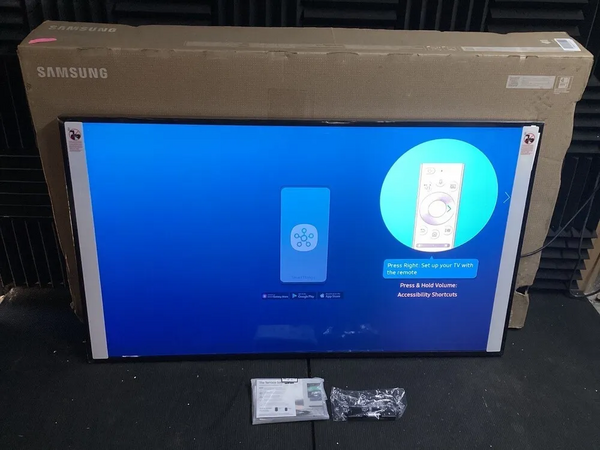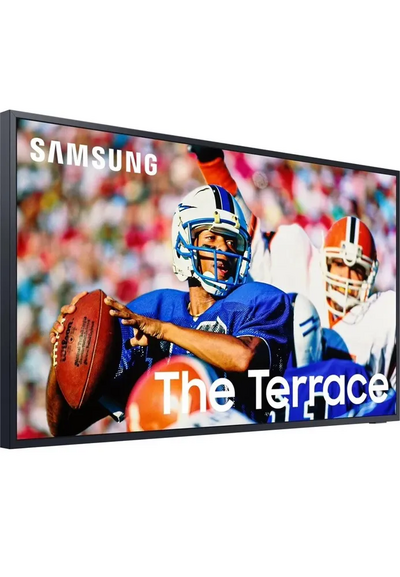
Samsung Qn65lst9taf
| Brand | Samsung 2021 |
| Model | QN65LST9TAFXZA |
| Released Year | 2021 |
| Type | TV |
| Screen Size | 65 inches |
| Resolution | 3840 x 2160 (4K UHD) |
| Refresh Rate | 120Hz |
| Display Technology | MicroLED |
| Built-in Digital Tuner | ATSC |
| Status | Active |
Quick view
Overview
The Samsung QN65LST9TAFXZA represents a cutting-edge 65-inch MicroLED TV with advanced display technology, combining self-emissive MicroLED pixels to deliver exceptional brightness and contrast. MicroLED technology enables individual LEDs to act as pixels, resulting in perfect black levels and infinite contrast ratios without the need for backlighting. It supports 4K UHD resolution with HDR10+ for enhanced color accuracy and dynamic range, ensuring vivid and lifelike images. The TV integrates a powerful Quantum Processor Lite for optimized picture quality and AI-enhanced upscaling. Connectivity options include multiple HDMI 2.1 ports, USB 3.0, Wi-Fi 6E, and Bluetooth 5.2, supporting seamless streaming and gaming experience. The TV runs on the Tizen OS smart platform, offering a wide selection of apps and voice assistant compatibility for a smarter home entertainment solution.
Designed with minimal bezels and a slim profile, the QN65LST9TAFXZA focuses on immersive viewing with an ultra-smooth refresh rate of 120Hz. It features advanced motion handling technologies and supports adaptive sync technologies like VRR and ALLM, ideal for gaming enthusiasts. The sound system is enhanced with Object Tracking Sound+ and Q-Symphony technology, delivering immersive 3D audio experiences. The use of MicroLED also contributes to higher energy efficiency compared to traditional LCD or OLED displays. This model is targeted at premium users seeking a next-generation display technology and superior smart TV functionality.
Specifications
| MPN | QN65LST9TAFXZA |
| Model | Samsung QN65LST9TAF |
| Display Technology | MicroLED |
| Built-in Digital Tuner | ATSC |
| Smart TV Features | Voice Interaction, Internet Browsing |
| Refresh Rate | 120Hz |
| Features | UpScaling to 4K, Virtual Surround, Bluetooth, Wi-Fi Enabled, Headphone Jack, Ethernet Port, Wall Mountable, HDR TV |
| Screen Size | 65 inches |
| Audio/Video Inputs | Digital Audio Optical TOSLINK, USB, HDMI |
| Maximum Resolution | 2160p (4K) |
| Release Year | 2021 |
| Resolution | 3840 x 2160 (4K UHD) |
| HDR Support | HDR10+, HLG |
| Processor | Quantum Processor Lite |
| Smart OS | Tizen |
| HDMI Ports | 4 x HDMI 2.1 |
| USB Ports | 3 x USB 3.0 |
| Wireless Connectivity | Wi-Fi 6E, Bluetooth 5.2 |
| Audio | Object Tracking Sound+, Q-Symphony |
| Voice Assistants | Bixby, Alexa, Google Assistant |
| Dimensions (WxHxD) | Approximately 57.4 x 32.6 x 1.2 inches (without stand) |
| Weight | Approximately 36 kg (79.4 lbs) |
| Energy Efficiency | Class A+ |
| Special Features | MicroLED self-emissive pixels, Adaptive Sync (VRR, ALLM), Ultra Viewing Angle |
Images
Key Advantages
The Samsung QN65LST9TAFXZA boasts self-emissive MicroLED technology, providing superior brightness and perfect blacks with infinite contrast.
Its 4K UHD resolution combined with HDR10+ support ensures vibrant and accurate color reproduction.
Low latency and HDMI 2.1 support make it an excellent choice for high-end gaming setups.
The inclusion of the latest Wi-Fi 6E standard and Bluetooth 5.2 ensures fast, reliable wireless connectivity.
Tizen OS offers a robust smart platform with broad app compatibility and voice assistant integration.
Additionally, the TV delivers an immersive audio experience using Object Tracking Sound+ and Q-Symphony technologies.
Limitations
As a pioneering MicroLED TV, the Samsung QN65LST9TAFXZA commands a premium price point, which may be prohibitive for average consumers.
The availability of MicroLED content and optimization is still limited compared to OLED or LCD TVs.
Its relatively large panel size (65-inch) might not fit in smaller room spaces comfortably.
While offering many advanced features, the complexity of MicroLED repair or servicing may result in higher maintenance costs.
Compared to OLEDs, MicroLED technology is still maturing and may exhibit minor uniformity issues in some units.
The TV does not include traditional local dimming zones since each pixel emits its own light, which can be seen as a limitation in certain specific display scenarios.
FAQ
What display technology does the Samsung QN65LST9TAFXZA use?
It utilizes MicroLED technology, which consists of individual self-emissive LEDs acting as pixels to deliver superior contrast and brightness.
Does this TV support HDR formats?
Yes, the Samsung QN65LST9TAFXZA supports HDR10+ format for enhanced dynamic range and color accuracy.
What smart platform is installed on this TV?
The TV runs on Samsung's Tizen OS, providing access to popular streaming apps and voice assistant integration.
What connectivity options are available?
This model includes HDMI 2.1 ports, USB 3.0, Wi-Fi 6E, and Bluetooth 5.2 connectivity for versatile device integration.
Is this TV suitable for gaming?
Yes, it supports 120Hz refresh rate, VRR, and ALLM technologies, making it well suited for gaming applications.
What audio technologies are implemented in this TV?
It features Object Tracking Sound+ and Q-Symphony technology to deliver an immersive and synchronized audio experience.
Is the Samsung QN65LST9TAFXZA still available for purchase?
Yes, as of now, this model has not been discontinued and is available in the market.
Disclaimer
The content on is provided for general informational purposes only. We do not guarantee the accuracy, completeness, or reliability of any information, specifications, or visuals presented on the site.
is not responsible for any content, images, or data uploaded or shared by users. Users are solely responsible for the content they submit.
We may include links to third-party websites for convenience. We do not endorse or take responsibility for the content or policies of any external sites.
Use of the site is at your own risk. Always verify critical information independently before making decisions based on content from this website.




